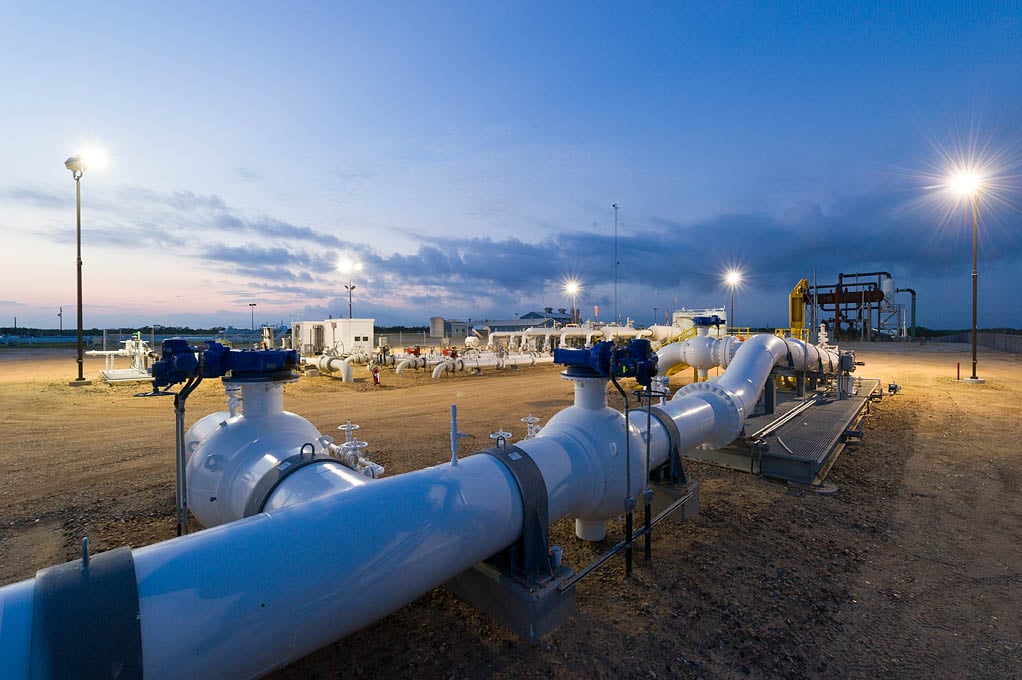Energy
New Kinder Morgan Keeps Focus on Cash and Shareholder Returns
Published:
Last Updated:

We’re about to find out. The main purpose of Kinder Morgan’s buyout of Kinder Morgan Energy Partners LP (NYSE: KMP), Kinder Morgan Management LLC (NYSE: KMR) and El Paso Pipeline Partners LP (NYSE: EPB) is the conversion of Kinder Morgan shares into KMBucks, essentially a new currency the company can use to acquire more assets at a much lower cost of capital.
In a presentation on Kinder Morgan’s website, the company offers a pro forma example of a hypothetical new project costing $1 billion compared with a similar project executed by the current KMP. Assuming a 12% cash return on either project, the cash flow of $120 million would cost KMP unitholders $64 million in new equity, $19 million in new debt, and $18 million in the general partner’s share, yielding incremental cash flow of just $18 million to divvy up among unitholders.
The combined companies would have to pay $19 million in taxes that KMP avoids as a master limited partnership (MLP), but the cost of new equity drops to $23 million, the cost of new debt drops to $13 million, and the general partner share vanishes. Incremental cash flow rises to $65 million.
Kinder Morgan’s presentation indicates that the company has a backlog of projects totaling $17 billion in capital spending. Some 88% of the backlog includes fee-based pipelines, terminals and associated facilities. Back in December, KMP bought five Jones Act tankers to carry crude between U.S. ports. The acquisition demonstrated the difficulty in getting new pipeline projects approved. It also demonstrated that there’s more than one way to grow, even if the growth is slower than one would like. KMP didn’t want to get into the shipping business, but it had no choice. Richard Kinder is betting that the combined companies will not be forced into making similar choices.
KMP common units are traded up more than 13% just over an hour into Monday’s trading session. Units posted a new 52-week high of $98.67 shortly after the market opened Monday morning. The 52-week low is $71.32. Investors have apparently figured out that the pre-market trading levels of up about 30% had no basis in reality. There will not be a bidding war here — Richard Kinder can guarantee that.
KMI shares traded at $38.00 an hour into the open, up more than 5%, after posting a new 52-week high of $42.49. The stock’s 52-week low is $30.81.
ALSO READ: Kinder Morgan Sinks as Profits Fall
A financial advisor can help you understand the advantages and disadvantages of investment properties. Finding a qualified financial advisor doesn’t have to be hard. SmartAsset’s free tool matches you with up to three financial advisors who serve your area, and you can interview your advisor matches at no cost to decide which one is right for you. If you’re ready to find an advisor who can help you achieve your financial goals, get started now.
Investing in real estate can diversify your portfolio. But expanding your horizons may add additional costs. If you’re an investor looking to minimize expenses, consider checking out online brokerages. They often offer low investment fees, helping you maximize your profit.
Thank you for reading! Have some feedback for us?
Contact the 24/7 Wall St. editorial team.